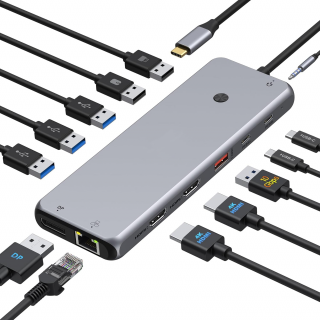USB-C Universal Docking Station w/ Tripple Monitor Video Out for GNU/Linux (TPE-USBDOCKLC2)Universal docking station technology has greatly advanced in recent years. In part thanks to USB tech getting faster, offering increased power, and the elimination of poorly supported dedicated video translation chips. On devices that support DisplayPort™ over USB Type-C for example users are able to take advantage of a systems built-in DisplayPort, but without having to plug in a separate video cable. When a systems USB-C port is connected internally to the on-board DisplayPort™ users can take advantage of utilizing 4K+ screens at high frame rates. In older docking stations and USB video adapters that rely on DisplayLink technology users can generally expect to run into problems with video output performance (lower frame rates and video output resolutions) as well as problems upgrading to new OS releases. The later due to proprietary drivers and the lack of proper integration with Linux. Other benefits of a modern USB Type-C docking station include ample power for any devices connected without the need for having to connect a separate power cable.
GNU/Linux users can expect full support now and long into the future on all recently released distributions: On laptops that support multiple video outputs over USB-C you can hookup up to three monitors via the docking station using 1 x HDMI (up to 4K @ 60Hz) port, 1 x HDMI (up to 4K @ 60Hz) port, and 1 x DisplayPort (up to 8K @ 30Hz) port. It also comes with 2 x USB C ports (both ports support 100W Power Delivery and up to 10Gbps data transfer), a USB 3.1 (10Gbps) port, 3 x USB 3.0 ports, 2 x USB 2.0 ports, a 3.5mm audio output port, and a gigabit ethernet port.
Approximate Size: 13 x 0.5 x 5 inches Approximate Cable length: 9.5 inches Partial List Of Supported Releases: * Trisquel 9, 10, 11, 11.01 Slint 15.0 Slackware 15.0 Ubuntu 18.04, 18.10, 19.04, 19.10, 20.04, 20.10, 21.04, 21.10, 22.04, 22.10, 23.04, 23.10, 24.04, 24.10, 25.04 Fedora 28, 29, 30, 31, 32, 33, 34, 35, 36, 37, 38, 39, 40, 41, 42 Debian 10, 11, 12 Lubuntu 18.04, 18.10, 19.04, 19.10, 20.04, 20.10, 21.04, 21.10, 22.04, 22.10, 23.04, 23.10, 24.04, 24.10, 25.10 Peppermint Linux OS 9, 9 Respin-2, 10, 10 Respin, 10 Respin 20191210, 2022-02-02, 2022-10-02, 2022-11-07, 2022-11-28, 2023-07-01, 2023-10-15, 2024-07-01 Kubuntu 18.04, 18.10, 19.04, 19.10, 20.04, 20.10, 21.04, 21.10, 22.04, 22.10, 23.04, 23.10, 24.04, 24.10, 25.04 Linux Mint 19, 19.1, 19.2, 19.3, 20, 20.1, 20.2, 20.3, 21, 21.1, 21.2, 21.2 Edge, 21.3, 21.3 Edge, 22, 22.1 Linux Mint Debian Edition (LMDE) 4, 5, 6 elementary OS 5.0, 5.1, 5.1.2, 5.1.3, 5.1.4, 5.1.5, 5.1.6, 5.1.7, 6, 6.1, 7, 7.1, 8, 8.0.1 Rocky Linux 9 Series 9.0, 9.1, 9.2, 9.3, 9.4, 9.5, 9.6 Rocky Linux 8 Series 8.4, 8.5, 8.6, 8.7, 8.8, 8.9, 8.10 AlmaLinux 9 Series 9.0, 9.1, 9.2, 9.3, 9.4, 9.5, 9.6 AlmaLinux 8 Series 8.3, 8.4, 8.5, 8.6, 8.7, 8.8, 8.9, 8.10 CentOS Stream 8, 9 CentOS 8 Series 8.0, 8.1, 8.2, 8.3, 8.4, 8.5, 8.6, 8.7, 8.8, 8.9, 8.10 Red Hat Enterprise Linux (RHEL) 10 Series 10.0 Red Hat Enterprise Linux (RHEL) 9 Series 9.0, 9.1, 9.2, 9.3, 9.4, 9.5, 9.6 Red Hat Enterprise Linux (RHEL) 8 Series 8.0, 8.1, 8.2, 8.3, 8.4, 8.5, 8.6, 8.7, 8.8, 8.9, 8.10 Zorin OS 15, 15.1, 15.2, 15.3, 16, 16.1, 16.2, 16.3, 17, 17.1, 17.2, 17.3 * Mageia 7, 7.1, 8, 9 Manjaro 22.0, 22.0.1, 22.0.2, 22.0.3, 22.0.4, 22.0.5, 22.1.0, 22.1.1, 22.1.2, 22.1.3, 23.0, 23.0.1, 23.0.2, 23.0.3, 23.0.4, 23.1.0, 23.1.1, 23.1.2, 23.1.3, 23.1.4, 24.0, 24.0.1, 24.0.2, 24.0.3, 24.0.4, 24.0.5, 24.0.6, 24.0.7, 24.0.8, 24.1.0, 24.1.1, 24.1.2, 24.2.0, 24.2.1, 25.0.0 Most other recently released distributions are also compatible. If in doubt just ask. * Mageia users: Don't forget to disable your firewall from the Mageia Control Center > Security > Set up your personal firewall and check the box that says Everything (no firewall) or otherwise set some other custom setting to permit network access. * Trisquel users: Trisquel 9+ is supported * While no support is available the docking station is also compatible with Microsoft Windows 10 & at least some versions of Mac OS X |

